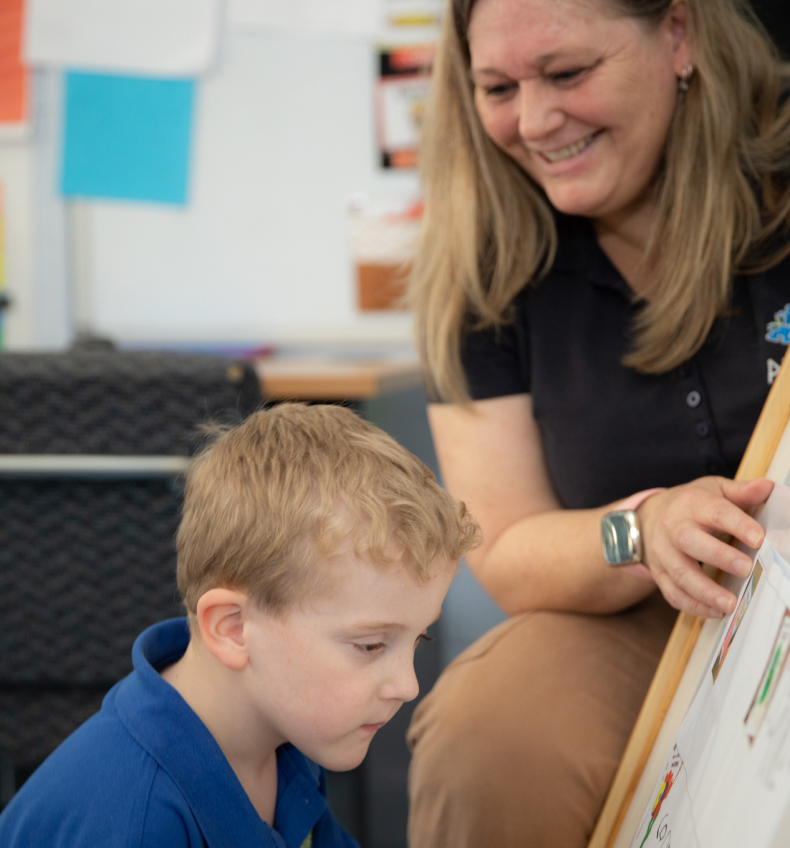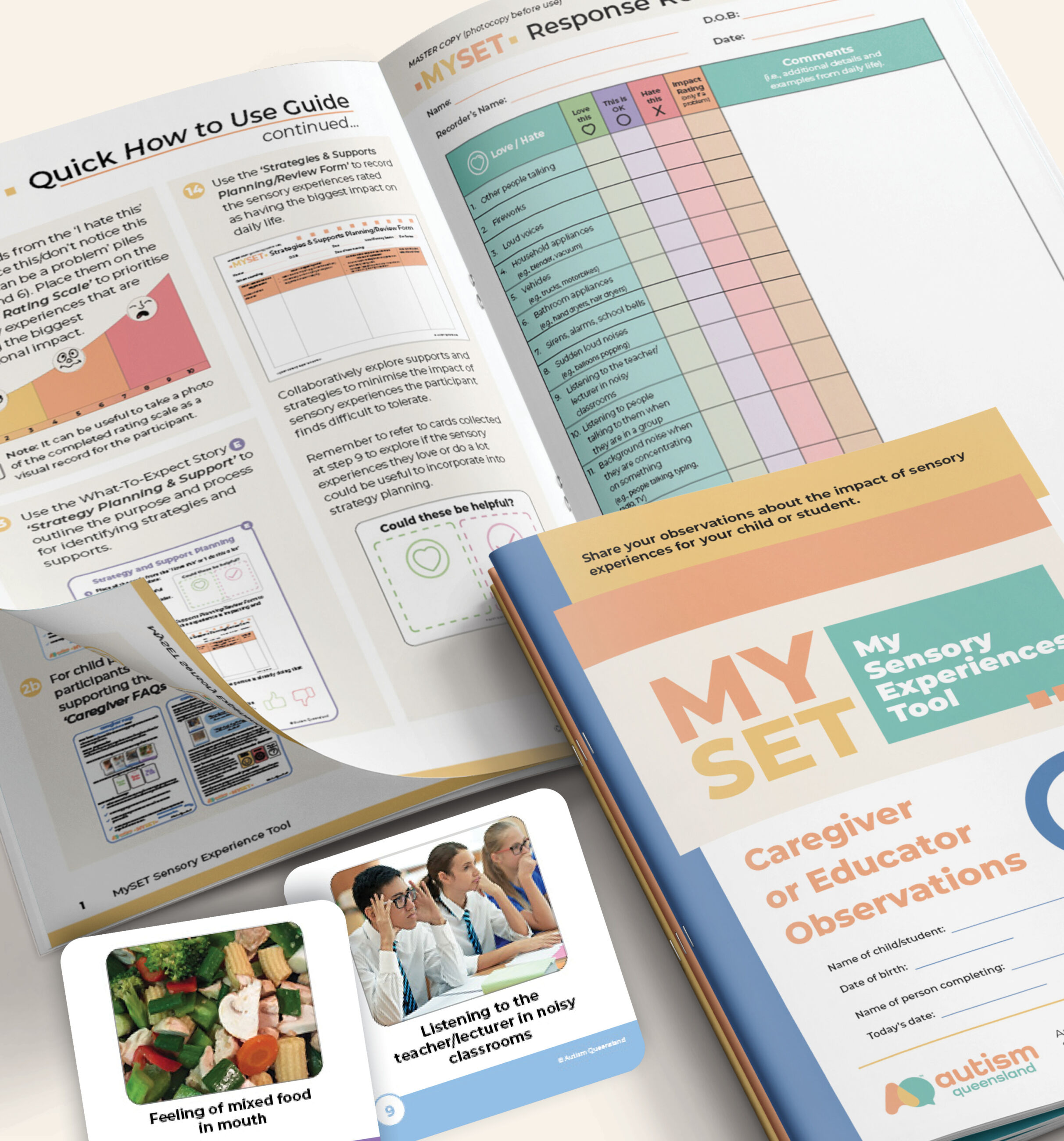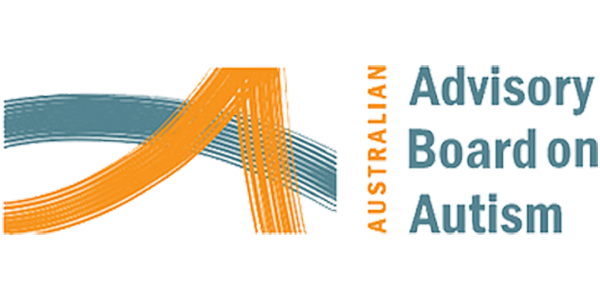** Discounts apply for bulk purchases of the MYSET. When purchasing 4-6 copies of MYSET in one transaction, you are eligible for a 5% discount. When purchasing 7 copies or more of MYSET you are eligible for a 10% discount. Please contact [email protected] to generate a custom invoice with these discounts applied. These are payable via direct transfer or credit card over the phone with our finance department.
An innovative resource poised to transform the way we understand and support sensory experiences for autistic and neurodivergent individuals.
Developed in collaboration with a diverse team of researchers and autistic consultants, the My Sensory Experiences Tool (MYSET) represents a groundbreaking approach to sensory exploration and advocacy.

MYSET supports engagement, advocacy, and meaningful participation in daily life.
At the core of MYSET is a profound acknowledgment of the uniqueness and complexity of sensory experiences. MYSET offers a descriptive, qualitative framework that honours the individual’s lived context. By refraining from classifying sensory processing as “poor,” “dysfunctional,” or “atypical,” MYSET fosters understanding, compassion, and advocacy, empowering individuals to articulate their needs and preferences effectively.
✅ MYSET will be a once off payment with no ongoing costs for forms.
🏆 Developed by the AWARD-WINNING team of the Adolescent/Adult Goal Setting Tool (AAGST).
This tool revolutionises sensory processing support by embracing a neurodiversity-affirming approach:
- Recognising individuals as experts in their own experiences.
- Embracing sensory differences as integral aspects of identity.
- Acknowledging the role of environment in exacerbating sensory challenges and advocating for environmental modifications.
- Supporting individuals in developing personalised strategies to overcome barriers.
- Encouraging self-advocacy for accommodations that enhance well-being.
💖 Caregiver/educator versions of MYSET are included to support very young children and people with high support needs.
MYSET can be used in a range of practice contexts including schools, individual therapy, positive behaviour support planning, mental health support planning, supported accommodation, and employment services.
MYSET is more than an assessment; it’s a collaborative journey toward enhanced understanding and support. Through visual card sorting and collaborative development of strategy and support plans, MYSET supports engagement, advocacy, and meaningful participation in daily life.
We envision MYSET as a game-changer for professionals and caregivers alike. Occupational therapists, speech pathologists, psychologists, teachers and other professionals supporting autistic and neurodivergent individuals will find MYSET invaluable in tailoring strategies and support plans. Moreover, caregivers and educators will gain invaluable insights into the sensory experiences of those they support, fostering a more inclusive and supportive environment.
Giving voice to everyday sensory experiences of autistic and other neurodivergent individuals.
MYSET has undergone three cycles of extensive participatory action research involving autistic people with a diversity of communication differences and ages (8 to 54 years), family members, and professional practitioners.
MYSET is suitable for autistic and neurodivergent children and adults. Children as young as five years have contributed to the completion of this resource with the support of a parent and a professional practitioner. People with mild intellectual disability have successfully used MYSET. Caregiver/educator versions of MYSET are provided to support very young children and people with high support needs.
What does MYSET include?
MYSET is a visual card sort tool designed to empower autistic and other neurodivergent individuals to share their everyday sensory experiences. This includes exploring their preferences and needs, as well as identifying the impact of problem sensations on their daily life. A Strategy & Support Plan is developed collaboratively with participants to enhance outcomes, support advocacy, and minimise barriers to meaningful participation in life.
MYSET includes:
- User Manual
- Quick Start Guide & Resource Booklet
- Quick How-To-Use Guide
- Master Response Record Forms
- Master Strategies & Supports Planning/Review Form
- Participant & caregiver FAQ cards
- “What-To-Do” story cards for all phases of the tool sort
- Coloured sorting base plates for all phases of the tool sort
- 60 x “Love/Hate” sensory experience cards
- 15 x “Seeking/Stimming” cards
- 8 x “Noticing Sensations” cards
- Large poster-sized Impact Rating Scale
- Strategy & Support Planning guides
- Caregiver & Educator Observations Booklet & resources
- Miscellaneous guidance cards:
- I’m Not Sure
- Something Else
- Take A Break
- STOP
- I have a question….
No ongoing costs for new forms or resources. Everything you need in one easily-bundled package for one price.
Tool background Information
The history of MYSET is that it was originally developed for research. It was further developed due to many requests from therapists who wanted to use the tool clinically. Listening to the voice of autistic people is crucial for better understanding their sensory experiences. Information about sensory processing is typically gathered through parent/caregiver questionnaires to provide information about unusual sensory issues of their autistic child. Data may also be collected through teacher questionnaires or direct observation. The perspective of the autistic child or adult is less commonly taken into account.
Reports from caregivers can be valuable as families often adapt their routines to accommodate the sensory preferences of autistic people by reducing their exposure to sensory experiences that they find unpleasant (Bagby, Dickie & Baranek, 2012). Nevertheless, according to the principles of person-centred practice (Taylor & Taylor, 2013), it is imperative that the views of autistic people about their sensory issues are also heard. Williams (1996) highlighted the need to listen to “the autistic voice” to better understand their sensory experiences. Increasingly, autistic advocates are calling for the voice of autistic people to be heard. They recommend exploration of better ways to garner the views of all autistic people including children and adults with communication challenges (Leadbitter, Buckle, Ellis & Dekker, 2021).
Sensory experiences are unique to each individual and other people’s perspectives are an interpretation of what the autistic person is actually experiencing, which may or may not be accurate. Therefore, to understand these experiences, it is necessary to move beyond standardized norm-referenced sensory processing assessments. MYSET does not attempt to provide numerical scoring aimed at differentiating typical and atypical responses. Rather, MYSET yields nuanced qualitative information about sensory experiences that are unique to the person’s life context.
MYSET aims to empower autistic people to describe their sensory worlds to others. Eliciting the perspective of autistic people can sometimes be difficult because they often experience challenges in communicating their experiences (Kwok, Brown, Smyth, & Cardy, 2015). Communication of sensory experiences is particularly challenging because sensory processing is an abstract concept. For example, the distress that autistic people experience in crowded, noisy environments, may not always be identified as a sensory issue. However, autistic people have also been shown to have relative strengths in processing pictures as compared to words (Kamio & Toichi, 2000). MYSET embraces this strength in visual processing by combining visual cues with simple text on cards to support autistic people sharing their everyday sensory experiences.
MYSET adopts a card-sorting prioritisation method, which has already proven to be effective in the development of Autism Queensland Goal Setting Tools including the Family Goal Setting Tool: Disability Version (Rodger, O’Keefe, Cook, & Jones, 2012),
the Family Goal Setting Tool: ASD Version (Jones, Rodger, Walpole, & Bobir, 2018) and the Adult/Adolescent Goal Setting Tool (Ashburner et al, 2023, Autism Cooperative Research Centre, 2021).
As autistic adults find that impromptu or unstructured dialogue can contribute to their social anxiety, communication supports including mediating objects (such as cards with pictures) can provide a way to initiate and sustain social interactions (Müller, Schuler, & Yates, 2008). MYSET further engages autistic people to share potential strategies that may assist them to manage their everyday sensory challenges as well as advocate for supports and accommodations.
Developer details & contact information
The authors wish to give thanks to the research project participants who contributed to the evaluation and refinement of this tool. Special thanks must go to contributors with lived-experience of autism whose input helped shape this tool to be meaningful, valuable and inclusive.
Research and Development Team:
- Dr Jill Ashburner, BOccTHy, PhD
- Victoria Tomkins, BOccTHy (Hons)
- Dr Cerys Downing, BSc, BA, MAudSt, PhD
- Emily Rietberg, BSc (Hons) (Psych)
- Natasha Bobir, BSc (Hons) (Psych), MClinPsych
- Dr Jessica Hill, BOccThy (Hons), PhD
- Courtney Judd, BSc (Hons) (Psych)
Autistic Consultants:
- Alex Hill
- Jayden Hill
© 2024 Autism Queensland
Address: 437 Hellawell Road, Sunnybank Hills, Qld 4109
Phone: (07) 3273 0000
Email: [email protected]
Copyright Information
All Rights Reserved.
No part of this publication may be reproduced, stored in a retrieval system, or transmitted in any form or by any means, electronic, mechanical, photocopying, recording or otherwise without the prior written permission of the copyright owner and publisher. The only exceptions are:
- Reproducing copies of the Response Record Form and Strategies & Support Planning/Review Form, for the express purpose of providing documentation of sensory experiences sorting categories and individual plans.
- Reproducing copies of the Participant FAQs and Caregiver FAQs to support the purchaser’s use of the tool with individuals and families.
- Photographing the distribution of cards on the Impact Rating Scale for the express purpose of visually documenting the impact of sensory experiences on the participants life.




